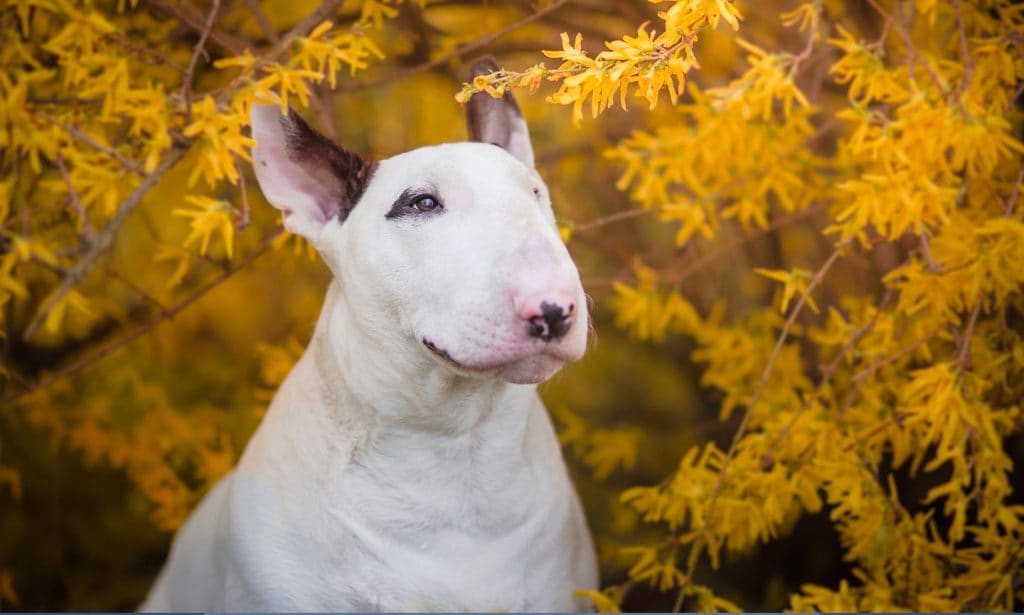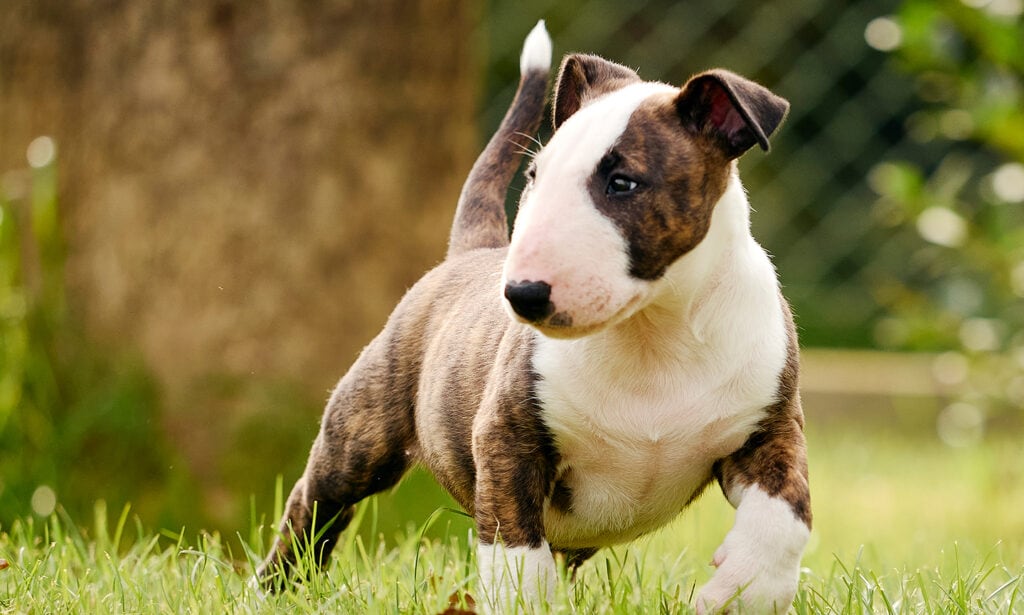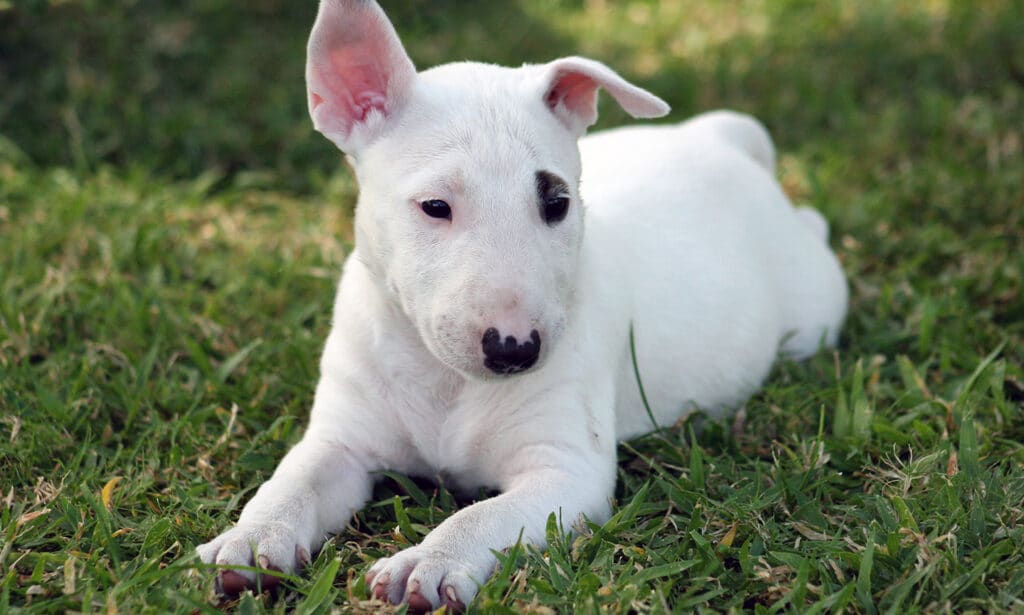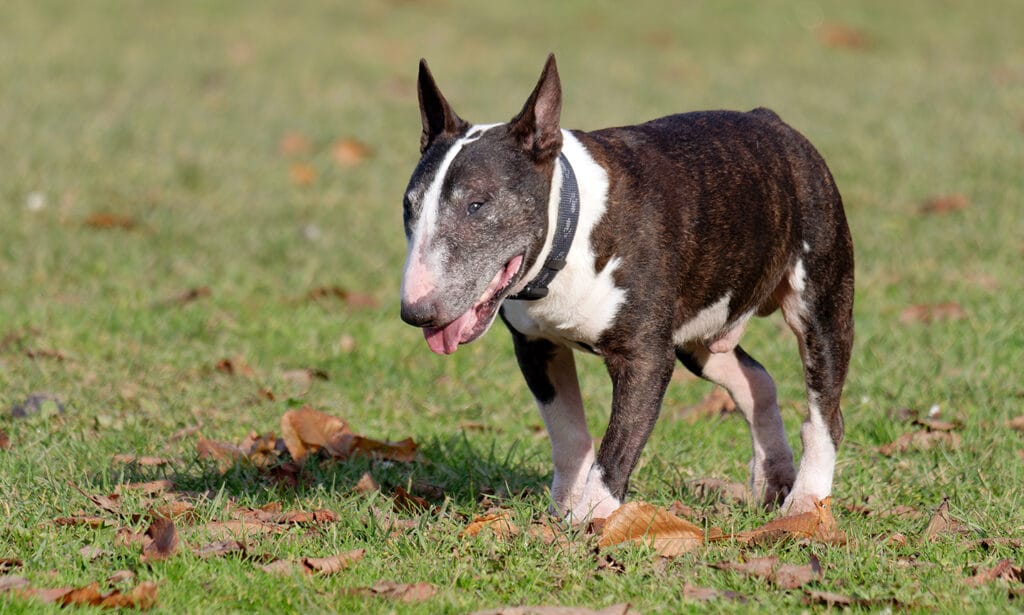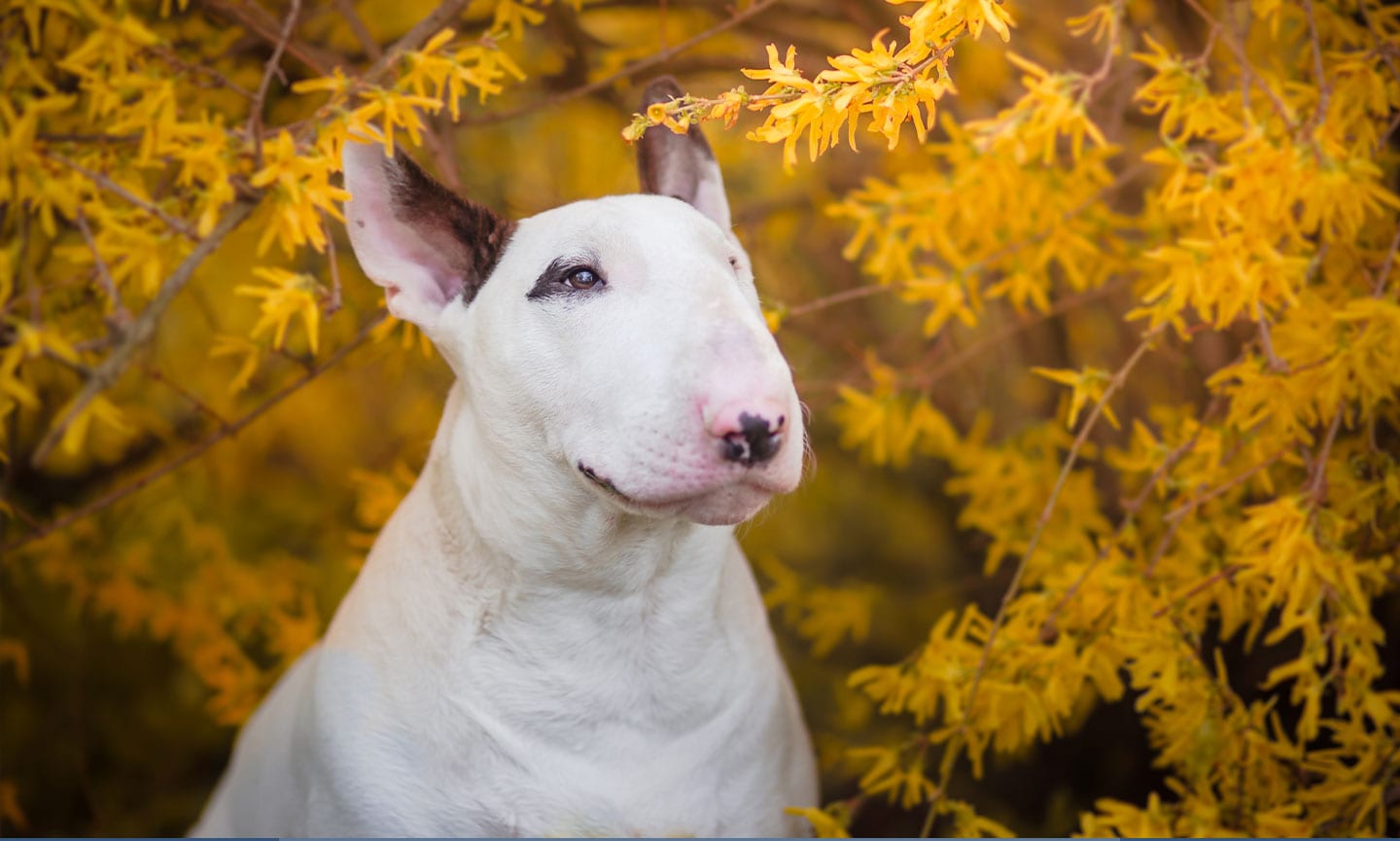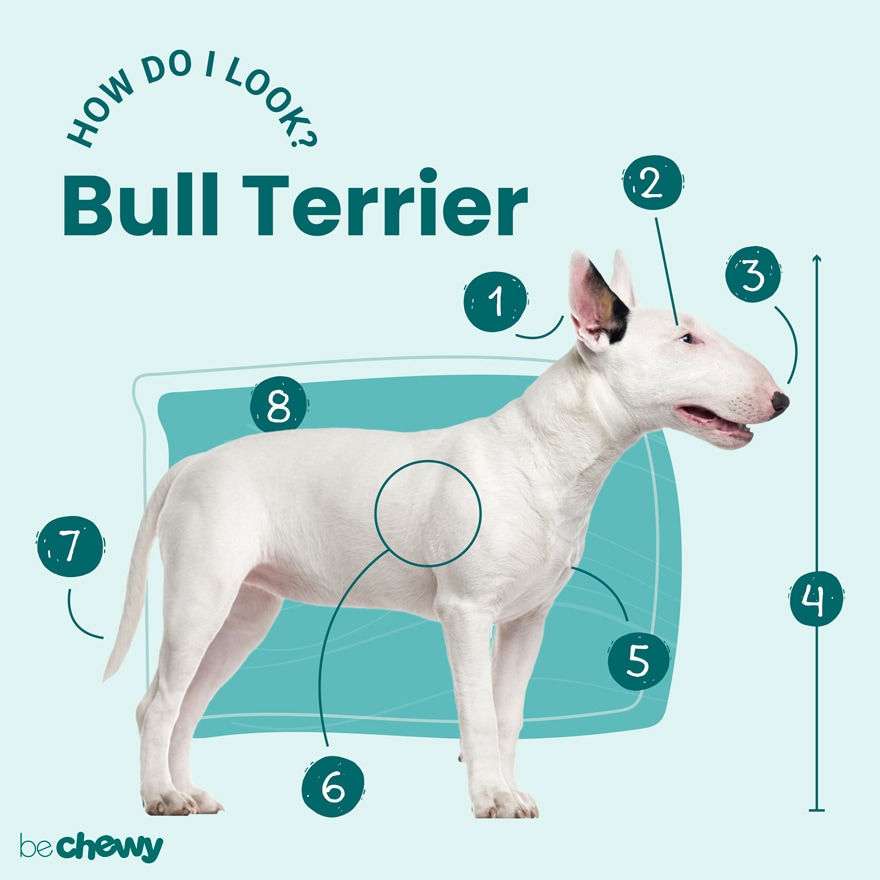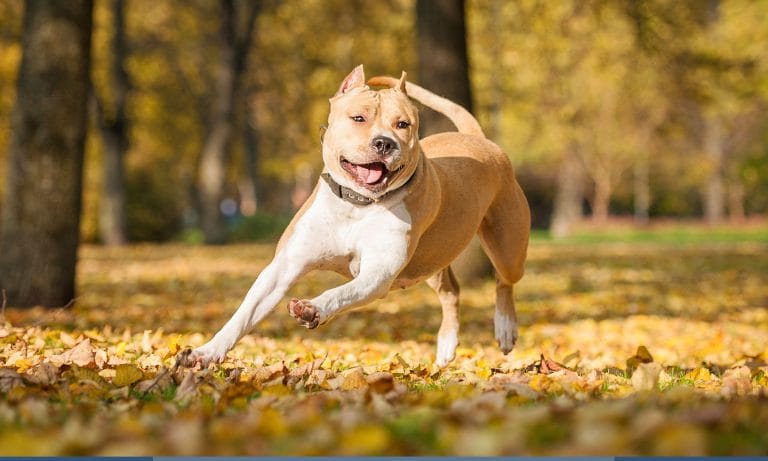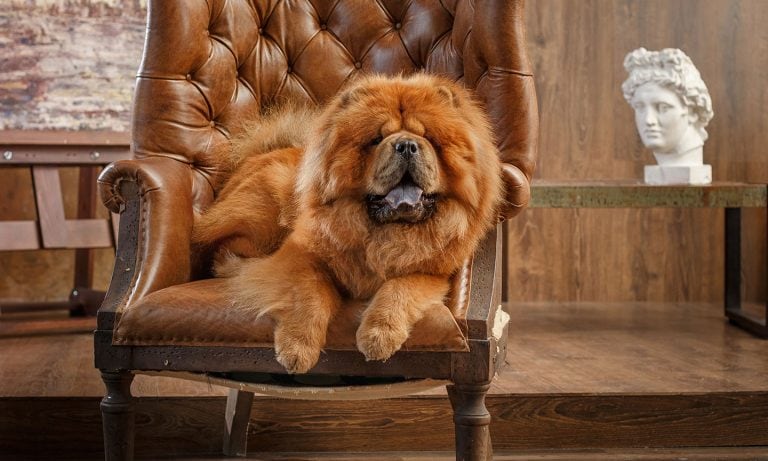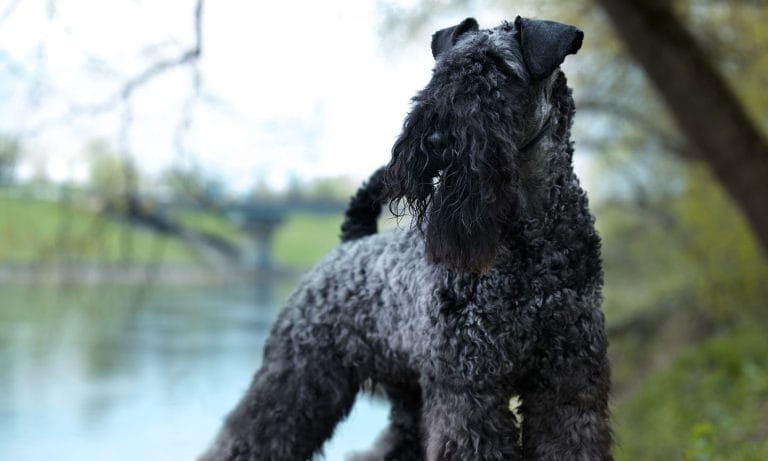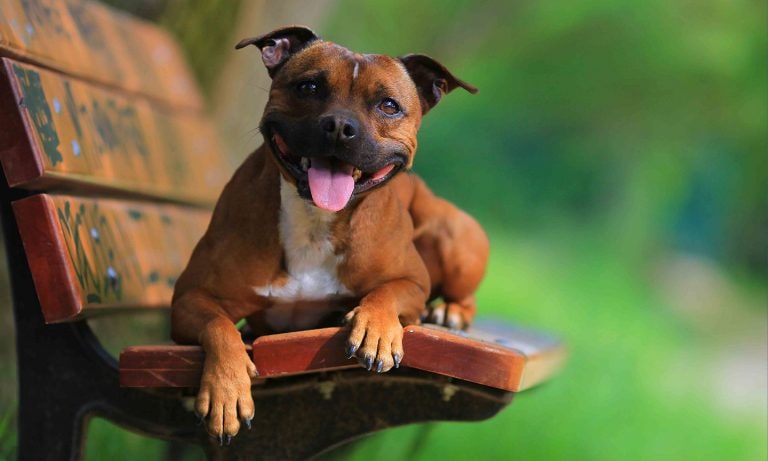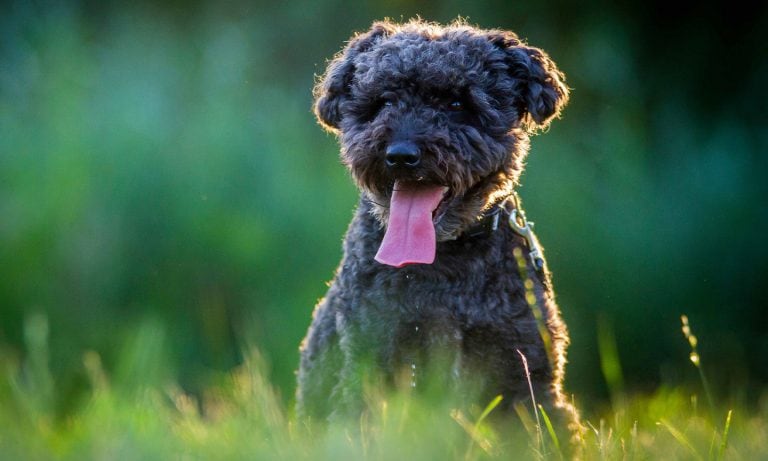If the Three Stooges were looking to add a fourth, the Bull Terrier would win the talent search. This clownish breed will chase their tail one minute, take off at full speed the next and then crawl into your lap for a snuggle right after crashing into the dining room table. But don’t fall for that confused look they’re giving you—they’re smarter than they let on and will pretend not to understand just to get what they want. Guaranteed to turn your frown upside down, the Bull Terrier is a great choice for someone looking to liven up their life. As stubborn and high-energy as they can be, their antics will keep you on your toes, in frequent fits of laughter and constantly smothered with affection.
Breed Snapshot
Temperament:
Class ClownRambunctiousEnergizer BunnyCoat Color:
Black BrindleBlack Brindle And WhiteBlack Tan And WhiteBrindleBrindle And WhiteRedRed And WhiteWhiteWhite And Black BrindleWhite And BrindleWhite And RedWhite Black And Tan
Best For
Playful and energetic, Bull Terriers excel with experienced and highly active pet parents who, ideally, live in large homes with yards and can provide plenty of training and socialization. Bull Terriers like to be the stars of the show, so they do best as a one-pet act.
Bull Terrier Temperament
The fiery-but-loveable Bull Terrier breed has an unmistakably larger-than-life personality. However, they can quickly turn destructive without consistent training and lots of attention, so make sure you keep an eye on them—and your furniture. For this four-legged companion, boredom is especially lethal. Although they are independent, strong-willed free thinkers, don’t leave them to their own devices for long.
Always up for a good time, this clown in a dog suit takes a back seat to no one and can be aggressive with other dogs in the family. Early socialization to family pets is recommended, and wait for kids to get a little older before bringing a Bull Terrier dog home. (Unless you have a cat. Bull Terriers refuse to share the stage with a cat.) They need a confident pup parent who has experience with dogs to help them remember they’re not directing this show. If you’re not confident in your abilities or haven’t had much experience with dogs before, a Bull Terrier puppy may not be the best match for you.
But for the right family, Bull Terrier dogs make the most loyal of companions and the most tireless of playmates. You’ll never be lonely again as they drag you out of the house for so many walks. They need lots of daily exercise and have loads of love to give their families. They are not wallflowers, so they like to meet new people and add them to the “troupe,” whether they’re chasing a friend in the park or greeting visitors at home. Just make sure you make the proper introductions; Bull Terriers are not as friendly as Cavalier King Charles Spaniels.
You’ll also appreciate their intelligence and agility. That fumbling, bumbling act they put on is just for appearances’ sake to get a laugh out of you.
How to Care for a Bull Terrier
Good news! Bull Terriers are relatively low-maintenance when it comes to grooming, thanks to their short coats that don’t shed very much. Think of it as the balance for all the time you’ll spend bonding through training and exercising.
Bull Terrier Health
Bull Terriers have a life expectancy of 12-13 years. Like any other breed, Bull Terriers can be susceptible to a range of health issues. It’s important you’re aware of potential health problems so you can help your pup live their healthiest life possible.
- Deafness: Bull Terriers are prone to partial or full deafness in one or both ears. There is no genetic screening test, so if you suspect your pup is having trouble hearing, your vet may recommend a specialized test called a BAER hearing test. However, often this type of testing is only done at universities or specialists. Dogs with hearing impairments can live full and happy lives and, in some cases, can even be taught hand signals for basic commands like “come” and “sit.”
- Hereditary Nephritis: Hereditary nephritis is an inherited form of kidney disease that usually develops in Bull Terriers at a young age; some, however, are born with it. The inflammation in the kidneys typically leads to kidney failure, although it may take years to do so. Ask your breeder if your pup has been tested for hereditary nephritis via genetic screening test. It’s also important to have annual bloodwork with your veterinarian.
- Heart Disease: Bull Terriers can be prone to heart murmurs and malformation of their mitral valve (the valve on the left side of the heart). If your pup has a murmur, your veterinarian will likely refer them to a veterinary cardiologist for an echocardiogram (ultrasound of the heart).
- Lens Luxation: Bull Terriers can be prone to losing their sight when the ligaments holding their eye in place deteriorate, causing lens dislocation. Depending on the severity, it may be treated with medication or surgery.
- Patellar Luxation: Patellar luxation is when a dog’s kneecap slips out of the joint. This condition can cause pain and arthritis. Patellar luxation can be managed by keeping your dog at a healthy weight and talking to your vet about joint supplements and pain medication. If severe, surgery may be recommended.
Bull Terrier History
The history of the Bull Terrier begins in the early 1800s in Britain where they were bred to take part in ferocious blood sports. These sporting dogs provided hours of gruesome (and illegal) entertainment in the basements of watering holes as onlookers would bet on the outcome.
While the “sport” originally began with Bulldogs, they were seen as too slow and awkward to pull their weight, so they were bred with the now-extinct white English Terrier to produce more energetic fighters. Once dog-fighting rings fell out of fashion, the Bull Terrier’s evolution continued as breeders started refining these so-called gladiators to create a better-looking companion for upper-class gentlemen.
The modern Bull Terrier came to be in the early 1860s by James Hinks and was later recognized by the American Kennel Club in 1885. Bull Terriers are not afraid of the limelight. One of the most famous Bull Terriers is Bullseye, the mascot for the Target department store, and author John Steinbeck and President Woodrow Wilson both had them as pets. Today, this dog ranks 62nd in popularity among all the breeds registered by the AKC.
Are you looking to add a Bull Terrier as a pet? You can find a list of reputable breeders on the American Kennel Club’s website. What’s the average Bull Terrier price? Expect to spend anywhere from $1,200-$2,000 for a pup who’s been screened for health and temperament issues and may even come with pedigree papers. You can also reach out to Bull Terrier rescue organizations or your local animal shelter to adopt one. Or, search Chewy’s database of adoptable dogs in your area.
FAQs
Are Bull Terriers hypoallergenic?
No, Bull Terriers are not hypoallergenic. Although they don’t shed as much as other breeds and produce less allergy-inducing dander, they are not recognized as a hypoallergenic breed by the AKC.
What were Bull Terriers bred for?
Bull Terriers were originally bred to take part in dog fighting rings in England. When those were outlawed, they were later bred to become companions for upper-class gentlemen.
Are Bull Terriers good with kids?
Bull Terriers are good with older, active kids. Because they’re strong, active dogs who don’t always know their own strength, it’s important to supervise their interactions with small kids and babies. It’s also important to socialize and train your Bull Terrier, and teach children how to properly interact with dogs.
What are the most popular Bull Terrier names?
Some of the most popular Bull Terrier names are Amber, Aubrey, Bandit, Biscuit, Copper, Vito, Rusty, Shadow, Spike, Grover, Sheffield, Wyatt and Wolf. Get more dog names.
What are the most common Bull Terrier mixes?
The most common Bull Terrier mixes are:
- Bull Terrier-Pit Bull mix (Bull Terrier-Pit Bull)
- Bull Terrier-Chihuahua mix (Bullhuahua Terrier)
- Bull Terrier-Labrador mix (Bull Terrier Labrador)
- Bull Terrier-German Shepherd mix (Bull Terrier German Shepherd)
- Bull Terrier-Boxer mix (English Bulldog Terrier)
- Bull Terrier-Corgi mix (Bull Terrier Corgi)
- Bull Terrier-Husky mix (Bull Terrier Husky)
Note: These are not purebred dogs but mixed breeds.
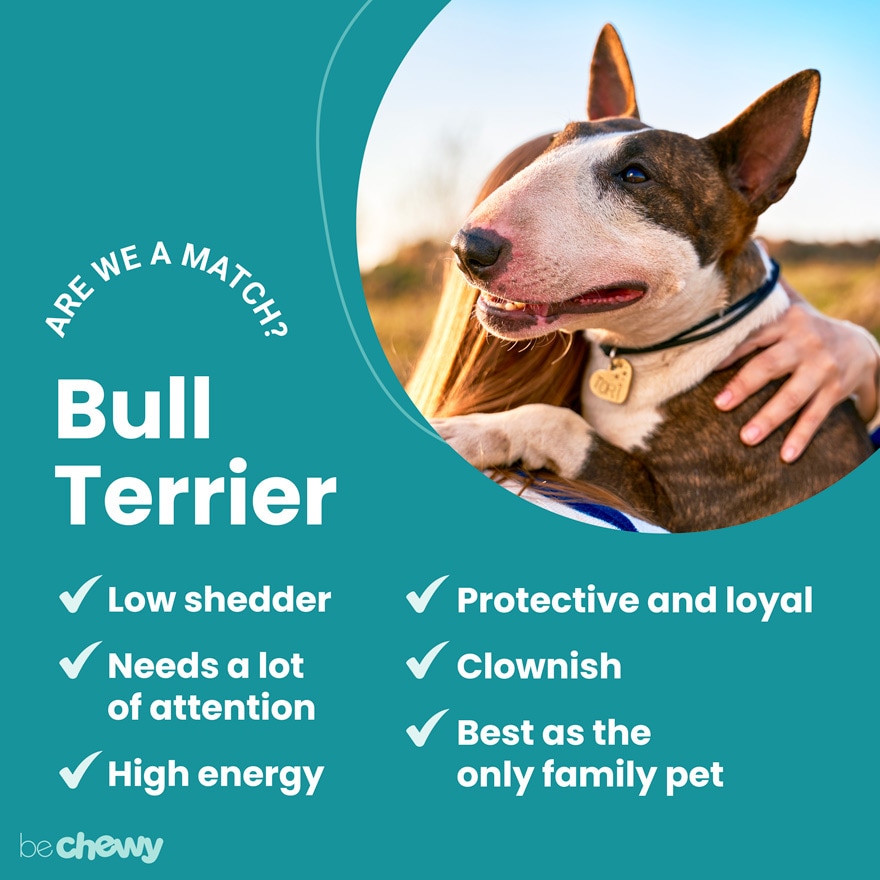
Top Takeaways
Bull Terriers make loyal, loving companions for active families and experienced pup parents. They require a lot of exercise, training and attention and should never be left on their own for long periods. They’ll do anything for a laugh and provide hours of entertainment to those who are up for the adventure.
Expert input provided by licensed veterinarian Dr. Travis McDermott of Durango Animal Hospital; and Los Angeles-based certified dog behaviorist and trainer Russell Hartstein, CDBC, CPDT-KA, founder of Fun Paw Care.
Breed characteristic ratings provided by veterinarian Dr. Sarah J. Wooten, DVM, CVJ, a veterinarian at Sheep Draw Veterinary Hospital in Greeley, Colorado; dog trainer and behavior consultant Irith Bloom, CPDT-KSA, CBCC-KA, CDBC, owner of The Sophisticated Dog, LLC, in Los Angeles; and certified animal behavior consultant Amy Shojai, CABC, in Sherman, Texas.
The health content was medically reviewed by Chewy vets.

Search for Adoptable Bull Terriers Near You
Female Names
- Luna
- Bella
- Lola
- Nova
- Roxy
- Nala
- Daisy
- Sadie
- Lucy
- Harley
Male Names
- Chico
- Max
- Zeus
- Milo
- Rocky
- Tank
- Rocco
- Apollo
- Loki
- Diesel
Share:
